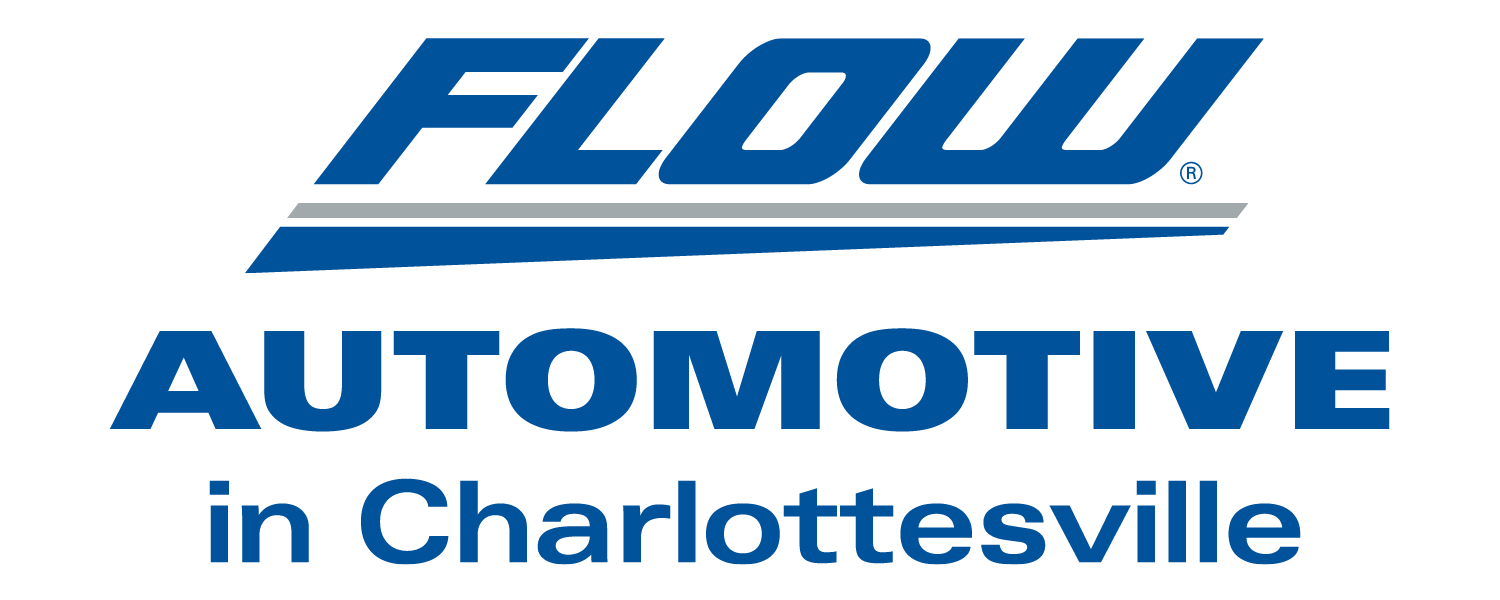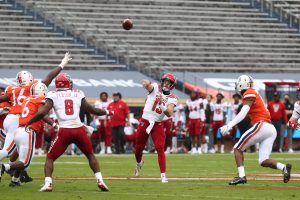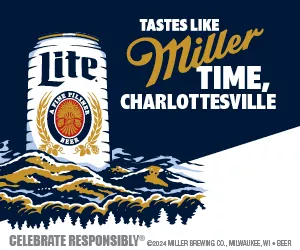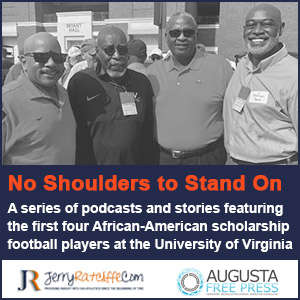What’s wrong with UVA’s defense? Havoc disappeared against NC State
By Jerry Ratcliffe
After a frustrating loss to NC State last Saturday, Virginia fans are wondering what happened to the defense that was supposed to be the strength of the Cavaliers’ football team.
If UVA’s defense can’t create “havoc,” then what can it do?
In the opening week against Duke, the havoc factor in the Cavaliers’ defense was evident: seven gained turnovers, five quarterback sacks, and more. Last week, in a game that Virginia needed to win, the Cavaliers gained one turnover and never sacked Wolfpack quarterback Devin Leary.
Part of that was because State chose to “max protect” the quarterback, keeping more blockers in to protect Leary, rather than send them out on pass routes.
That prevented UVA from creating havoc, and it showed.
So what can co-defensive coordinators Nick Howell and Kelly Poppinga do to combat such a strategy? Wake Forest likely won’t require max protection because it runs an RPO (run/pass option) offense. Still, if the Deacs choose to go that route, or if perhaps another team in UVA’s not-so-distant future (Miami, UNC) go with that strategem, what can the Cavaliers counter with?
“There’s different tempos of defense,” Bronco Mendenhall said this week. “There’s kind of, for lack of a better word, the everyday tempo or every-play tempo, which is your base.
“To get to the two-minute there’s kind of a prevent tempo. Then there’s zone pressures, which is somewhere between your base and man pressures, and then all-out blitz, so there’s different tempos. Dropping eight is somewhere between base and prevent, so anytime that you start getting heavy, heavy protection, then the different tempos have to be blended to account for that.”
Mendenhall went on to explain that if a team chooses to max protect, then it can actually work in the defense’s favor in another way, because it can rush just three and drop eight into pass coverage to defend limited receivers. Virginia can do that, but it has to do it more effectively.
Virginia did that effectively against NC State, as Devin Leary completed only 11 of 25 passes and had one intercepted. While Leary completed less than 50 percent of his attempts, he was somewhat efficient by passing for 184 yards and two touchdowns.
Still, Virginia isn’t getting much of a pass rush. Even though the defense may be hurrying Leary, there’s a big difference between hurrying a quarterback and putting him on the ground.
UVA has two sacks collectively over its last two games. Mendenhall and his defensive staff are somewhat mystified by the fact that they haven’t gotten more production out of two of the team’s more dynamic players, outside linebackers Charles Snowden and Noah Taylor. Both are versatile, experienced players who can not only pressure the quarterback, but also drop into coverage.
Taylor, the third-leading tackler on the team (19 tackles), has 1.5 sacks, 3.5 tackles for loss, two pass breakups and two quarterback hurries. Snowden is sixth on the team in tackles (14), has one tackle for loss, no sacks, two hurries and two pass breakups.
The only Wahoo with two sacks is sixth-year defensive end Richard Burney.
“We need more production,” said Howell, when evaluating Snowden’s season after three games. “Simple as that. We just need him to produce more than he currently is.”
How does that happen? Is it putting Snowden in better situations to succeed or just a more determined effort from the towering linebacker?
“Are we asking him to do the right thing?” Howell said. “Are we putting him in the position to do the right things? And then, is he putting himself in position?
“Is he doing what he’s being asked to do within the scheme? So those are two things we’re looking at; are we asking him to do the right things, and then is he playing to his potential. If those two things are on, then I think production will increase. If those two things are off, well, then something’s off.”
Howell said he doesn’t believe opponents are scheming around Snowden or anyone else on the defense, and that Snowden needs to continue to work hard and play the best he can.
Snowden only played 38 snaps against NC State, and according to Pro Football Focus grades, Taylor has been in coverage more than he has been in pass rush. How has that impacted UVA’s ability to create havoc?
“A reallly good point,” Mendenhall said. “After games one and two, we felt like Charles needed a little bit more rest. In terms of the season coming, the volume we were putting on him as well as special teams and how hard he practices, it looked like he was going to lose ground rather than gain ground over the course of the year.”
Perhaps it would be a prudent move to remove Snowden from special teams and allow him to focus on what he does best and create havoc. Surely the staff can find capable replacements for him on special teams.
Mendenhall said that because safety Joey Blount was sidelined by an injury for the NC State game, the defense had to rely on Taylor to drop more into coverage, assigning him a more “secondary-ish” role rather than a pass rush.
“When you put them with games one and two, we just think collectively, those two positions can and need to be at a higher level,” Mendenhall said. “We also can use them differently. Last week, for different reasons that I just shared, it kind of got in the way of the production as well.”
The defense seemed to take a step backward last week and that’s something that Virginia can’t afford to repeat in Winston-Salem on Saturday afternoon against the Deacons’ RPO-designed offense.
Wake Forest can be lethal with its style of play, which puts a tremendous amount of pressure on quarterback Sam Hartman to make precise reads and quick decisions. Hartman will hold onto the football much longer than a regular quarterback as he reads the defensive linemen and linebackers, looking for a gap for his running back.
If the gap is there, Hartman will either hand off to the back or keep the ball himself, and possibly look for another hole. If the defense is shutting down the run, then he’ll pull the ball and look to pass.
At least that may prevent the Deacs from max protection, but will put pressure on UVA’s front seven to maintain gap credibility and read Hartman.
Howell didn’t particularly like the way his defense performed last week against State, especially in the first half.
“No good,” he said. “Like everybody else, it’s as simple as that when [State] scored a lot and we didn’t score like we do. We did not play well, we did not do our jobs, and [State] did. We missed assigments, we missed playmaking. We have to improve upon that.”
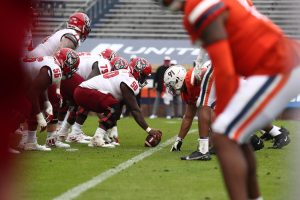 For the second consecutive week, Virginia will face an offense that uses a fast tempo.
For the second consecutive week, Virginia will face an offense that uses a fast tempo.
“They try to put you to sleep and ask you to be disciplined (with the runs),” Howell said. “They stress you in a lot of different areas and I really like what they do. I respect that.”
Wake is No. 24 nationally in rushing offense (268 per game), 29th in passing offense (142.56), and 29th in total offense (429.7), and is averaging 40.3 points per game (13th best in the country).
Those numbers are somewhat skewed because the Deacs put up 66 points on Campbell, which clearly can’t compete against a Power 5 program at this point.
Still, with UVA’s offense struggling last week and likely playing with a backup and somewhat limited quarterback this week, is there more pressure on the Cavalier defense to carry the team?
Howell said no.
“I mean, our mentality is always going to be that we’re going to go out there and if the ball is placed between the [goalline] and the other [goalline], our job is to stop [the opponent],” he said. “I would say the focus on our team is that we play complimentary football. Our job is to stop them and then repeat. We have not been a ‘blow-you-out’ team (offensively). We’ve been good in all phases and that’s where our focus lies.”
But when complimentary football isn’t working, if the offense doesn’t hold up its end, then what?
“The challenge on defense is to stop them from scoring, and so wherever the ball is placed, that means stop them,” Howell said. “If you make a situation bigger than it is, literally take the yard lines out of it, take the paint off the field, put the football down. You have to stop people from moving the ball to score.
“So why does it matter where the ball is? If you acknowledge that, then I think you’re not a true competitor and you’re looking for a way out, so I don’t buy into if the ball was there, then that’s the excuse for the non-competitor. The competitor does not care where the ball is placed. The true competitor is going to go out there and try to do his job with no excuse.”

